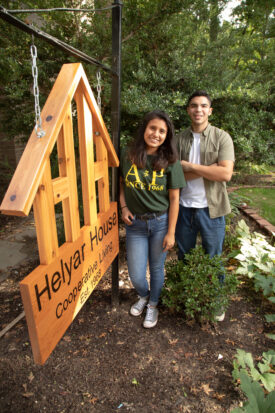
Helyar House Residence Scholarships offer SEBS students the advantages of cooperative living, as well as financial assistance.
Strong coordination between offices can dramatically improve institutional quality and impact. An interdisciplinary Rutgers School of Environmental and Biological Sciences (SEBS) team that designed and implemented a new online SEBS scholarship application program is a prime example of such collaboration. The scholarship application process—traditionally requiring students to submit paper applications for in-person faculty review—was completely reconstructed to create a fully web-based process, allowing for more accurate and efficient data gathering, supporting a more effective faculty review process, and improving communication with students and donors. The project was particularly timely given its support of a critical process during the unexpected challenges of the COVID-19 pandemic.
The scholarships contribute to reducing the financial burden for a number of SEBS students. For the 2021-22 school year, 678 scholarships were awarded, totaling $742,400 in funds. “SEBS school-based scholarship program serves a diverse range of student populations by awarding school scholarships that positively impact student academic progress, retention, and the quality of the SEBS student experience,” explained assistant dean Joe Ventola. He added, “The scholarship program is administered with a holistic approach that includes an open application process for all enrolled SEBS students. Scholarship criteria are based on academic merit or financial need or a combination of both. Consideration for student activities and challenging student circumstances are also part of the scholarship review and selection process.”
“This process could not have been accomplished without the timely intervention, hard work, and collaboration of this team of faculty and staff,” said Julie Traxler, associate dean for academic programs. “The SEBS scholarship program is now stronger and more effective in its mission to positively impact student academic progress, retention, and the quality of the SEBS student experience.”
In fall 2019 (timing that seems prescient now) SEBS Office of Academic Programs (OAP) staff began to assemble a team and plan how to move the detailed process to new digital platforms. Ventola and OAP administrative assistant Laura Mitchell initiated communications with SEBS Office of Information Technology Services associate director Karl Lindauer and application developer Donna Guadagno, to discuss available technology and ways to enhance and customize the scholarship application and data collection process. Lindauer and Guadagno brought technology expertise and were critical to the creation and design of an online application that had to gather significant student data to provide the key information required by the SEBS Faculty Financial Aid (Scholarship) Committee to appropriately assign awards within donor requirements.
The expanding team recognized they needed the help of partners like Carolann Pierre at the University Office of Financial Aid to gain access and understand many data fields from financial aid (student aid, expected family contributions, etc.) that are significant to the process. Pierre shared her knowledge of OFA processes and data and provided digital access to critical information to make data compilation much more effective and efficient.
Once student applications were received, the team sought partners with expert assistance and expertise in working with enormously complex data and turned to assistant director of research technology Lucas Marxen and web/application developer Dan Farnsworth of the NJAES Office of Research Analytics. Marxen and Farnsworth were vital partners in managing and integrating the data fields to create a master spreadsheet of an enormous amount of information needed for the holistic review while ensuring integrity of the data.
Ventola and Mitchell then created electronic documents that would enable individual holistic reviews of student applications. Digital folders were created to bring together applications, faculty recommendations, and the student information sheets critical to the work of the faculty. Along with academic merit and/or financial need criteria, the faculty have flexibility to consider students’ extenuating personal circumstances including challenging family and personal situations, high financial need, illness, and disability.
The cross-disciplinary faculty committee is comprised of James White (Plant Biology), David Tulloch (Landscape Architecture), Peter Khan (Biochemistry), Jeffra Schaefer (Environmental Science), Suzanne Sukhdeo (Ecology, Evolution, & Natural Resources), Barry Jesse and Carol Bagnell (Animal Science), Chitra Ponnusamy (Food Science), Malcolm Watford (Nutritional Science), and Jenice Sabb-Dumas (SEBS EOF). The faculty members provided expertise in creating an effective digital review process moving the committee’s work from paper applications traded across a conference table, to a more streamlined and efficient process, without losing the important holistic nature of each review.
With faculty review complete, the team turned to more effectively communicating critical information, particularly to donors and to recipients. Development specialist Margaret Chang from the SEBS Philanthropic and Strategic Partnerships office worked with the team to manage the data and design the communication tools for donors. The team focused on how to utilize the data to more effectively communicate with donors about their scholarship recipients and ensuring the continued cultivation of strong relationships with the donors.
The team’s work also created important changes to student notification. Students are now notified via email mail merge to provide more efficient and accurate communication and to eliminate previous cumbersome and expensive paper processes. Additionally, with these updates, OAP is now able to notify all students applicants of results, even if they did not receive an award. These changes are critical to demonstrating transparency and responsibility in a critical process.
“This team’s work was particularly extraordinary given that it supported a critical process during the unprecedented times of the COVID-19 pandemic and the unexpected move to remote work. Simply, this important process could not have been accomplished without the timely intervention, hard work, and collaboration of this team of faculty and staff,” said Traxler. “This team’s work has made the SEBS Scholarship process much more efficient, effective, and responsive to student needs, ensured the quality of the process, and improved communication to scholarship donors and students.”

